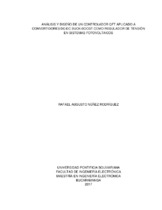| dc.contributor.advisor | Director. Pinzón Ardila, Omar | |
| dc.contributor.author | Núñez Rodríguez, Rafael Augusto | |
| dc.coverage.spatial | Bucaramanga | spa |
| dc.coverage.temporal | 2018 | |
| dc.date.accessioned | 2020-03-31T19:56:47Z | |
| dc.date.available | 2020-03-31T19:56:47Z | |
| dc.date.issued | 2018 | |
| dc.identifier.uri | http://hdl.handle.net/20.500.11912/5132 | |
| dc.description | 72p.: (pdf); il; gráficas; anexos. | spa |
| dc.description.abstract | En este trabajo se presenta un controlador robusto basado en la teoría de realimentación cuantitativa, por su sigla en inglés QFT, para un convertidor DC•DC Buck•Boost en modo de conducción continua que regula el voltaje suministrado por un generador fotovoltaico de 190 Wp. El funcionamiento adecuado del generador fotovoltaico está ligado a las condiciones ambientales, además de la eficiencia del regulador, especialmente la eficiencia con que se genera ciclo de conmutación del convertidor para mantener la tensión de salida en un rango aceptable. Las estrategias de control convencional trabajan bajo ciertas restricciones, las cuales no se cumplen en condiciones de operación real del regulador, por tanto, el funcionamiento de éste se ve afectado al someterse a perturbaciones de entrada como resultado de las variaciones de la tensión generada por el panel, que se producen como consecuencia de los cambios en las condiciones climáticas que modifican la irradiación recibida por el generador solar. De igual forma, el punto de operación del convertidor varia, a causa de perturbaciones en la salida producto de los cambios de carga. y las variaciones paramétricas del convertidor. La estrategia de control propuesta se diseña utilizando técnicas de diseño basado en modelo, en el entorno de Simulink de MatlabOD y la Toolbox Simscape para el modelamiento de sistemas físicos. El esquema de control QFT se ha modificado a partir de una estructura tipo Predictor de Smith para sistemas de fase no mínima, mostrando un comportamiento robusto del voltaje de salida del regulador ante cambios en la impedancia de carga. variación del punto de operación del convertidor al variar la irradiación solar y la temperatura del generador fotovoltaico, consiguiendo de esta forma que el controlador propuesto cumpla con las especificaciones de desempeño preestablecidas, reduciendo el esfuerzo en la señal de control en comparación con un controlador PI convencional | spa |
| dc.description.abstract | This paper presents a robust controller based on the theory of quantitative feedback, for its acronym in English OFT, for a DC-DC converter Buck-Boost in continuous driving mode that regulates the voltage supplied by a 190 Wp photovoltaic generator. The proper functioning of the photovoltaic generator is linked to the environmental conditions, in addition to the efficiency of the regulator, especially the efficiency with which the converterl's switching cycle is generated in order to maintain the output voltage in an acceptable range. Conventional control strategies work under certain restrictions, which are not met under real operating conditions of the regulator. therefore, the operation of the latter is affected when subjected to input disturbances as a result of variations in the voltage generated by the panel, which are produced as a result of changes in climatic conditions that modify the radiation received by the solar generator. In the same way, the operating point of the converter varies, due to disturbances in the output caused by load changes, and the parametric variations of the converter. The proposed control strategy is designed using model-based design techniques in the Matlab® Simulink environment and the Simscape Toolbox for modeling physical systems. The OFT control scheme has been modified from a Smith Predictor type structure for non-minimum phase systems. showing a robust behavior of the regulator output voltage before changes in the load impedance, variation of the operating point of the converter to the vary the solar irradiation and the temperature of the photovoltaic generator, achieving in this way that the proposed controller complies with the preset performance specifications, reducing the effort in the control signal compared to a conventional PI controller | eng |
| dc.format.mimetype | application/pdf | |
| dc.language.iso | spa | |
| dc.publisher | Universidad Pontificia Bolivariana | spa |
| dc.rights | Attribution-NonCommercial-NoDerivatives 4.0 International | * |
| dc.rights.uri | http://creativecommons.org/licenses/by-nc-nd/4.0/ | * |
| dc.subject | Reguladores eléctricos | spa |
| dc.subject | Generadores de energía fotovoltaica | spa |
| dc.subject | Convertidores de corriente eléctrica | spa |
| dc.subject | Simulink - Software | spa |
| dc.title | Análisis y diseño de un controlador QFT aplicado a convertidores DC-DC Buck-Boost como regulador de tensión en sistemas fotovoltaicos | spa |
| dc.type | Tesis de Maestría | spa |
| dc.publisher.department | Escuela de Ingenierías | spa |
| dc.publisher.program | Maestría en Ingeniería Electrónica | spa |
| dc.rights.accessRights | openAccess | spa |
| dc.type.hasVersion | publishedVersion | spa |
| dc.description.sectional | Bucaramanga | spa |
| dc.identifier.instname | instname:Universidad Pontificia Bolivariana | spa |
| dc.identifier.reponame | reponame:Repositorio Institucional de la Universidad Pontificia Bolivariana | spa |
| dc.identifier.repourl | repourl:https://repository.unab.edu.co/ | |
| dc.description.degreename | Magíster Electónico | spa |


